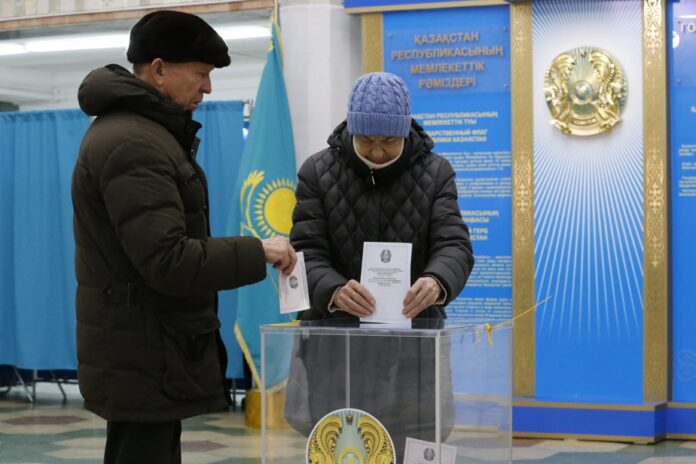(Astana) Kazakhstan voted on Sunday in early elections which could see independent candidates elected as deputies, a sign of a timid democratic opening despite the persistent authoritarian reflexes of the largest country in Central Asia.
President Kassym-Jomart Tokayev, like his predecessor Nursultan Nazarbayev, in power for three decades, went to the polls early.
The majority of polling stations, where some 12 million voters were called, closed at 9 a.m. ET, as the country has two time zones, and the first estimates of the results are expected at 2 p.m. from the east).
Among the novelties of this election, candidates not affiliated with parties can present themselves, a first since 2004. The threshold to enter the Majilis (lower house of Parliament with 98 elected members) has been lowered to 5% and a quota of 30 % for women, young people and people with disabilities has been introduced.
These changes have somewhat revived the ankylosed political landscape of this former Soviet republic bordering Russia and China, still marked by the deadly riots of January 2022.
“The electoral system has changed and gives the impression of choice. But in reality, the president and his administration keep the counting of the votes in their hands, ”tempers political scientist Dimach Aljanov.
“In an authoritarian country, elections are made to keep power, not to replace it,” Aljanov said.
These elections, which also concern local parliaments, take place following the constitutional reform of 2022 driven by Mr. Tokayev, in power since 2019.
The 69-year-old leader shows his desire to “continue the modernization” started last year of this country rich in natural resources.
Because strong inequalities and corruption have not disappeared and inflation, above 20%, is eating away at purchasing power.
Mr. Tokayev also broke up with his mentor, Nursultan Nazarbayev, after the January 2022 riots.
These demonstrations against the high cost of living had set the country ablaze and their repression officially killed 238 people.
After a sluggish presidential campaign in November, Almaty, one of the country’s two main cities, seemed to wake up timidly for these elections which coincide with the arrival of spring in this city nestled at the foot of imposing mountains.
“As independent candidates are admitted, I think the electoral system is changing for the better,” said Irina Rechetnik, a nurse.
For Ernest Serikov, an 81-year-old retired professor and supporter of the president, these elections are “experimental”.
On the windows of restaurants, construction barriers or lampposts, electoral posters have flowered in an anarchic way.
And the often abstruse slogans, such as “order is where the truth is”, “with me, there is no mess” or “I do not abandon the people” accompany unclear programs.
In total, seven parties are participating in this election, including two new ones registered in a short time. But several opposition parties and independent candidates remain banned.
But this abundance of candidates, with more than two elections on the same day, can confuse some. Many voters had not made their choice on the way to the polls.
And to warm up the undecided, food and drink were offered outside the polling stations to celebrate the Muslim holiday of Nowruz.
Political analyst Andrei Chebotarev believes that “at the end of these elections, four or five parties should be represented in Parliament”.
“This is good for power because parties loyal [to the president] will be present in parliament and Amanat, the presidential party, will retain the majority of seats,” he said.
“On the other hand, the diversity of parties will have an impact on the acceptance of the election result, both for the population and internationally,” concludes Mr. Chebotarev.
Despite this relative openness, Mr. Tokayev has already warned that “those who sow discord in the country will be severely punished”.


















